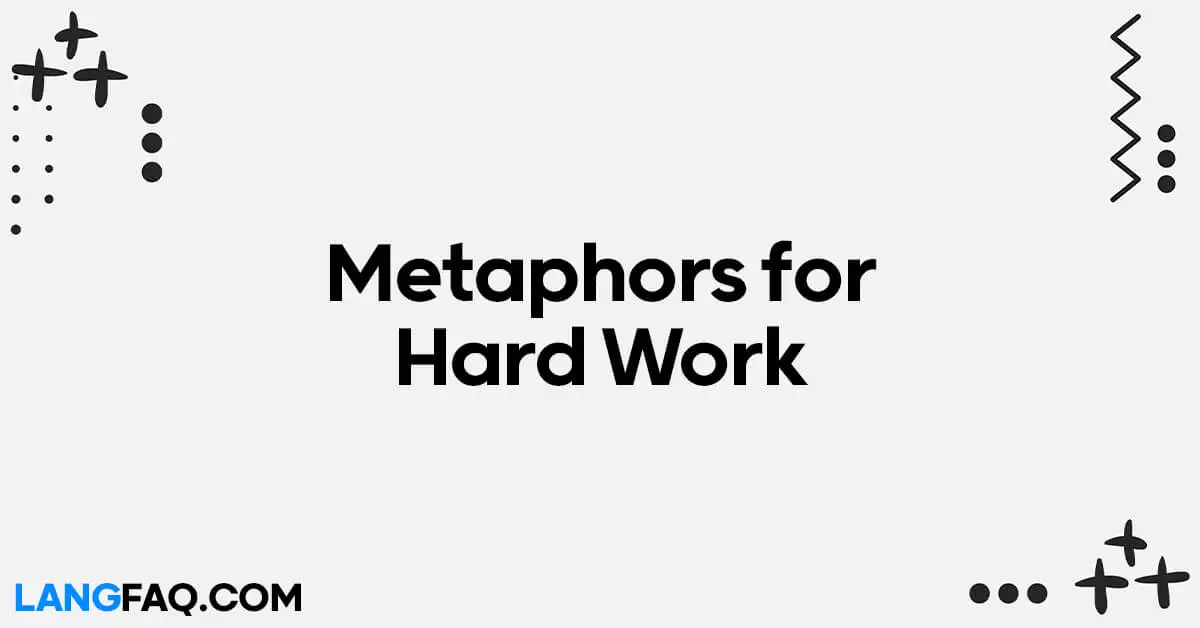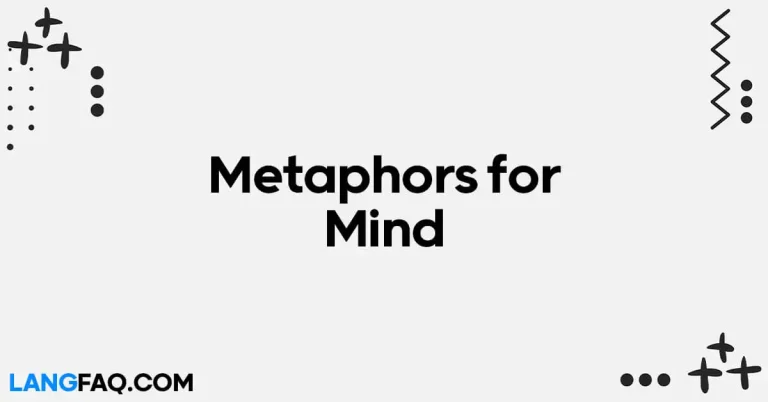In the pursuit of success, hard work is the driving force that propels us forward. It’s the unrelenting dedication, the tireless effort, and the unwavering commitment that lead to achievements.
But what if we look at hard work through a different lens? What if we see it as more than just a concept and instead, as a collection of powerful metaphors?
In this comprehensive guide, we will explore 26 metaphors for hard work, each shedding light on the remarkable qualities of perseverance and determination.
26 Metaphors for Hard Work
- The Grindstone Turn: Like sharpening a blade on a grindstone, hard work hones your skills and abilities.
- The Steep Climb: Hard work is akin to ascending a steep mountain, requiring persistence to reach the summit.
- The Iron Will: Just as iron is forged through heat and pressure, hard work strengthens your resolve.
- The Seedling’s Growth: Hard work parallels the growth of a seedling, reaching for the sun despite obstacles.
- The Architect’s Blueprint: Like an architect’s meticulous planning, hard work requires a clear vision.
- The Puzzle Solver: Hard work is like solving a complex puzzle, each piece representing a challenge.
- The Ocean Voyage: Navigating the ocean symbolizes the vastness of hard work’s challenges.
- The Midnight Oil: Burning the midnight oil signifies late-night dedication to your goals.
- The Phoenix Rising: Hard work is the phoenix rising from ashes, symbolizing rebirth after adversity.
- The Sculptor’s Chisel: Like a sculptor shaping stone, hard work refines your abilities.
- The Weaver’s Loom: Hard work involves weaving tasks together, creating a tapestry of success.
- The Farmer’s Harvest: Like a farmer’s patience, hard work leads to the harvest of achievements.
- The Musician’s Practice: Practice makes perfect, and hard work mirrors a musician’s dedication.
- The Explorer’s Journey: Embarking on an expedition represents the adventurous spirit of hard work.
- The Watchmaker’s Precision: Hard work demands meticulous attention, akin to a watchmaker’s craft.
- The Potter’s Wheel: Like a potter molding clay, hard work shapes and refines you.
- The Scientist’s Experiment: Hard work is a continuous experiment, where failures lead to discoveries.
- The Firewalker’s Path: Walking on hot coals symbolizes the courage required for hard work.
- The Warrior’s Battle: A warrior’s battle reflects the determination needed for success.
- The Marathon Runner: Running a marathon signifies the endurance of hard work.
- The Carpenter’s Craftsmanship: Hard work involves precision and building something worthwhile.
- The Astronomer’s Exploration: Exploring the cosmos mirrors the ambition of hard work.
- The Chess Grandmaster: Hard work is like a chess game, with strategic moves leading to victory.
- The Gardener’s Tender Care: Like a gardener’s nurturing, hard work requires dedication.
- The Novelist’s Manuscript: Writing a novel reflects the patience and creativity of hard work.
- The Alchemist’s Transformation: The alchemist’s quest symbolizes the transformative power of relentless hard work.
| Metaphor | Meaning | Example |
|---|---|---|
| The Grindstone Turn | Hones skills and abilities through effort and practice. | “His daily practice routine is the grindstone turn of his musical talent.” |
| The Steep Climb | Requires persistence and effort to overcome challenges. | “Launching a startup is like the steep climb of entrepreneurship.” |
| The Iron Will | Strengthens determination through challenges. | “Her iron will allowed her to persevere through the toughest times.” |
| The Seedling’s Growth | Symbolizes continuous progress despite obstacles. | “Just like a seedling’s growth, his hard work steadily propelled him forward.” |
| The Architect’s Blueprint | Involves careful planning and a clear vision. | “Creating a successful business requires the architect’s blueprint of a solid strategy.” |
| The Puzzle Solver | Requires tackling challenges piece by piece. | “Each project is a puzzle to solve, and hard work is the key to completing it.” |
| The Ocean Voyage | Navigating vast challenges and unpredictability. | “Starting a new venture feels like embarking on an ocean voyage of uncertainties.” |
| The Midnight Oil | Signifies late-night dedication and hard work. | “He burned the midnight oil to meet the project deadline.” |
| The Phoenix Rising | Represents rebirth and renewal after adversity. | “After facing setbacks, her determination was the phoenix rising from the ashes.” |
| The Sculptor’s Chisel | Refines skills and abilities through effort. | “Hard work is the sculptor’s chisel that shapes us into our best selves.” |
| The Weaver’s Loom | Involves weaving tasks together to achieve a goal. | “Like a weaver’s loom, hard work intertwines various elements to create success.” |
| The Farmer’s Harvest | Requires patience and nurturing for eventual rewards. | “Success is the result of hard work, much like a farmer’s harvest after a season of labor.” |
| The Musician’s Practice | Signifies the dedication to perfecting one’s craft. | “Her musical excellence is a testament to years of the musician’s practice.” |
| The Explorer’s Journey | Embodies the adventurous spirit of hard work. | “Entrepreneurship is an explorer’s journey into the unknown world of business.” |
| The Watchmaker’s Precision | Demands meticulous attention and accuracy. | “In science, precision and hard work are the watchmaker’s precision that yields breakthroughs.” |
| The Potter’s Wheel | Reflects the act of shaping and refining oneself. | “Hard work, like a potter’s wheel, molds us into who we are meant to become.” |
| The Scientist’s Experiment | Involves learning through trial and error. | “Every experiment is a chance for hard work to uncover new knowledge and innovation.” |
| The Firewalker’s Path | Signifies the courage to face challenges head-on. | “Launching a startup requires the firewalker’s path of taking risks and overcoming obstacles.” |
| The Warrior’s Battle | Reflects the determination and persistence required. | “Success in academics is a warrior’s battle that demands effort and resilience.” |
| The Marathon Runner | Symbolizes the endurance and perseverance needed. | “Achieving a successful career is a marathon runner’s journey of long-term commitment.” |
| The Carpenter’s Craftsmanship | Involves precision and attention to detail. | “Creating exquisite art is the carpenter’s craftsmanship of careful workmanship.” |
| The Astronomer’s Exploration | Mirrors the ambition and curiosity of hard work. | “Innovation is driven by the astronomer’s exploration of the unknown.” |
| The Chess Grandmaster | Reflects strategic planning and decision-making. | “Building a successful business requires the chess grandmaster’s strategy.” |
| The Gardener’s Tender Care | Signifies nurturing and dedication. | “A thriving relationship is like the gardener’s tender care, requiring attention and love.” |
| The Novelist’s Manuscript | Reflects patience and creativity in the process. | “Each book is a novelist’s manuscript, born from the author’s hard work and imagination.” |
| The Alchemist’s Transformation | Symbolizes personal growth and change. | “Through hard work, we undergo the alchemist’s transformation, evolving into our best selves.” |
These metaphors provide vivid imagery to help us better understand and appreciate the concept of hard work.
1. Diligence: The Steady Pursuit of Excellence
Definition: Diligence refers to a consistent and careful effort to achieve a goal or maintain a high standard.
Usage: Use “diligence” when discussing a formal work environment, emphasizing commitment and attention to detail.
Example: In a professional email, you might write, “Your diligence in meeting project deadlines is truly commendable.”
Variations:
- Meticulousness: Highlighting precision and thoroughness, suitable for tasks requiring extreme attention.
- Conscientiousness: Emphasizing a sense of duty and responsibility, often used in job descriptions.
Pros: Conveys a strong work ethic and dedication to quality. Cons: May sound formal and less relatable in casual conversations.
Grammar/Usage Rule: Use “diligence” as a noun, and “diligent” as the corresponding adjective.
2. Perseverance: The Unwavering Commitment
Definition: Perseverance signifies the determination to continue despite difficulties or setbacks.
Usage: Appropriate for both formal and informal contexts, “perseverance” conveys a resilient spirit.
Example: When encouraging a colleague, you could say, “Your perseverance in tackling challenges is inspiring.”
Variations:
- Tenacity: Emphasizes stubborn determination, often used in sports contexts.
- Grit: Refers to a combination of passion and perseverance, popularized in psychology.
Pros: Inspires determination and resilience. Cons: May be overused, so vary your vocabulary for impact.
Grammar/Usage Rule: “Perseverance” can be used as both a noun and a verb (persevere).
3. Graft: Putting in the Hours for Success
Definition: Graft is a colloquial term referring to hard work, especially when it involves long hours and effort.
Usage: Considered informal, “graft” is suitable for casual conversations among friends or colleagues.
Example: Chatting with a friend, you might say, “I’ve been putting in some serious graft at the gym lately.”
Variations:
- Hustle: Commonly used in entrepreneurial contexts, signifying energetic and determined work.
- Grind: Often used in professional sports to describe rigorous training and preparation.
Pros: Relatable and easy to understand in informal settings. Cons: May not be appropriate in formal or professional contexts.
Grammar/Usage Rule: “Graft” is primarily used as a noun, but it can also be used as a verb (to graft).
4. Dedication: The Wholehearted Commitment
Definition: Dedication implies a strong commitment and willingness to invest time and effort into a particular task or goal.
Usage: Suitable for both formal and informal contexts, “dedication” conveys a wholehearted approach to work.
Example: Writing a thank-you note to a mentor, you might express, “Your dedication to my growth has been invaluable.”
Variations:
- Devotion: Suggests a profound commitment, often used in personal relationships.
- Commitment: A straightforward term conveying a sense of obligation and responsibility.
Pros: Resonates with a sense of commitment and loyalty. Cons: Can be seen as slightly formal, so gauge the context accordingly.
Grammar/Usage Rule: Use “dedication” as a noun, and “dedicated” as the corresponding adjective.
5. Grindstone: Sharpening Skills through Effort
Definition: The grindstone represents the consistent effort required to refine and improve skills or abilities.
Usage: Best suited for informal conversations, “grindstone” adds a touch of metaphorical imagery to discussions.
Example: Talking to a colleague, you might say, “It’s time to put our noses to the grindstone and finish this project.”
Variations:
- Hard Yakka (Australian slang): Refers to strenuous work, often used informally.
- Daily Grind: Describes the routine tasks and activities of everyday life.
Pros: Provides a vivid image of persistent effort. Cons: Might not be universally understood, especially in non-English speaking regions.
Grammar/Usage Rule: “Grindstone” is primarily a noun and used as an idiom, so it doesn’t have a standard grammatical structure.
6. Commitment: The Pledge to Achieve Excellence
Definition: Commitment signifies a dedicated promise to work towards a particular goal or ideal.
Usage: “Commitment” is versatile and can be employed in both formal and informal settings.
Example: When addressing a team, you could say, “Our collective commitment to success will drive us forward.”
Variations:
- Devotion: Implies unwavering dedication, often used in personal and emotional contexts.
- Resolve: Suggests determination and firmness of purpose, suitable for formal speeches.
Pros: Conveys a strong sense of responsibility and determination. Cons: May sound slightly formal in casual conversations.
Grammar/Usage Rule: “Commitment” is a noun, and “commit” is the corresponding verb.
7. Vigilance: The Careful Watch over Progress
Definition: Vigilance entails a state of alertness and attentiveness in managing tasks and responsibilities.
Usage: Use “vigilance” in formal discussions to emphasize the need for careful monitoring and attention.
Example: In a project update meeting, you might state, “Maintaining vigilance over our timelines is crucial for success.”
Variations:
- Watchfulness: Emphasizes attentiveness and careful observation, suitable for formal reports.
- Alertness: Suggests readiness and awareness, often used in safety contexts.
Pros: Highlights the importance of careful oversight and responsibility. Cons: Can sound formal and may not be as relatable in informal conversations.
Grammar/Usage Rule: “Vigilance” is a noun, and “vigilant” is the corresponding adjective.
8. Slog: Putting in the Hard Yards
Definition: “Slog” is an informal term that means to work hard, often involving strenuous or repetitive tasks.
Usage: Use “slog” in informal conversations, particularly among friends or in casual work environments.
Example: Chatting with a colleague about a challenging project, you might say, “We’ll have to slog through this, but it’ll be worth it.”
Variations:
- Grind It Out: Similar to “slog,” emphasizing persistence and effort.
- Put in the Effort: A straightforward phrase to convey the need for hard work.
Pros: Informal and relatable, suitable for casual conversations. Cons: May not be appropriate in formal or professional contexts.
Grammar/Usage Rule: “Slog” is primarily a verb but can be used as a noun (the slog) to describe a period of hard work.
9. Zeal: The Enthusiastic Pursuit of Goals
Definition: Zeal refers to passionate and enthusiastic dedication to a particular cause or endeavor.
Usage: Appropriate for both formal and informal contexts, “zeal” adds a sense of fervor to discussions.
Example: When discussing a creative project, you could say, “Her artistic zeal is truly inspiring.”
Variations:
- Eagerness: Suggests keenness and enthusiasm, suitable for job applications.
- Ardor: Implies intense devotion and passion, often used in literary contexts.
Pros: Conveys a strong sense of enthusiasm and dedication. Cons: May sound somewhat formal in very casual conversations.
Grammar/Usage Rule: “Zeal” is a noun, and “zealous” is the corresponding adjective.
10. Elbow Grease: Good Old-Fashioned Hard Work
Definition: “Elbow grease” is a colloquial term referring to physical labor and manual effort.
Usage: Considered informal, use “elbow grease” in relaxed, everyday conversations.
Example: Talking to a friend about cleaning the garage, you might say, “We’ll need some elbow grease to get this done.”
Variations:
- Sweat Equity: Signifies hard work and effort invested in a project, often used in business contexts.
- Roll Up Your Sleeves: A metaphorical phrase encouraging readiness for hard work.
Pros: Informal and relatable, perfect for casual exchanges. Cons: May not be suitable for formal or professional discussions.
Grammar/Usage Rule: “Elbow grease” is a noun phrase that doesn’t have a standard grammatical structure.
11. Commitment: Building Trust and Reliability
Definition: Commitment in this context signifies a promise to fulfill one’s responsibilities or obligations reliably.
Usage: “Commitment” is versatile and can be used in formal, professional, and personal contexts to convey trustworthiness.
Example: In a business email to a client, you might say, “Our commitment to delivering quality services has earned us your trust.”
Variations:
- Promise: Emphasizes a solemn assurance to perform, often used in personal relationships.
- Pledge: Suggests a formal commitment and dedication to a cause or organization.
Pros: Conveys trust, reliability, and dedication. Cons: Can be slightly formal, so gauge the context accordingly.
Grammar/Usage Rule: “Commitment” is a noun, and “commit” is the corresponding verb.
12. Devotion: The Heartfelt Dedication
Definition: Devotion implies a deep and heartfelt commitment to a person, cause, or belief.
Usage: Suitable for both formal and informal contexts, “devotion” conveys a strong sense of emotional dedication.
Example: In a thank-you note to a mentor, you could write, “Your unwavering devotion to my growth has been life-changing.”
Variations:
- Adoration: Signifies intense love and admiration, often used in romantic contexts.
- Allegiance: Suggests loyalty and fidelity, suitable for formal discussions.
Pros: Evokes strong emotions and commitment. Cons: Can sound somewhat formal in very casual conversations.
Grammar/Usage Rule: “Devotion” is a noun, and “devoted” is the corresponding adjective.
13. Hustle: The Energetic Pursuit of Success
Definition: “Hustle” refers to energetic and determined efforts to achieve one’s goals, often in entrepreneurial or creative contexts.
Usage: Use “hustle” in informal and motivational discussions to inspire action and drive.
Example: Addressing a group of aspiring entrepreneurs, you might say, “Success in the business world often requires a relentless hustle.”
Variations:
- Drive: Signifies determination and ambition, often used in career-related discussions.
- Entrepreneurial Spirit: Emphasizes the proactive and innovative approach required in business.
Pros: Informal and motivating, suitable for casual and entrepreneurial conversations. Cons: May not be appropriate in very formal or traditional settings.
Grammar/Usage Rule: “Hustle” is primarily a verb but can also be used as a noun (the hustle) to describe the vigorous activity.
14. Labor: The Foundation of Productivity
Definition: “Labor” refers to the physical or mental effort expended in work, often in the context of productivity and production.
Usage: Use “labor” in formal and professional settings, particularly in discussions related to industry and production.
Example: In a factory management report, you might state, “The efficiency of our labor force directly impacts our production output.”
Variations:
- Workforce: Refers to the employees or laborers collectively, often used in HR discussions.
- Industry: Signifies the collective businesses and activities involved in production.
Pros: Formal and appropriate for professional discussions. Cons: May not be as relatable in casual conversations.
Grammar/Usage Rule: “Labor” is a noun, and “laborious” is the corresponding adjective.
15. Grit: The Resilience to Overcome Challenges
Definition: “Grit” represents the courage and perseverance to face and overcome challenges.
Usage: Appropriate for both formal and informal contexts, “grit” highlights resilience and determination.
Example: In a graduation speech, you could say, “Your journey to this moment is a testament to your grit and determination.”
Variations:
- Resilience: Emphasizes the ability to recover and adapt in the face of adversity, often used in psychological discussions.
- Fortitude: Suggests strength and courage in the face of challenges, suitable for formal discussions.
Pros: Conveys resilience and determination. Cons: Can be seen as slightly formal in very casual conversations.
Grammar/Usage Rule: “Grit” is a noun, and “gritty” is the corresponding adjective.
16. Drudgery: The Monotonous Side of Work
Definition: “Drudgery” refers to dull, repetitive, or monotonous work that requires sustained effort.
Usage: Use “drudgery” in both formal and informal contexts to describe the less glamorous aspects of work.
Example: When discussing routine tasks at the office, you might say, “The drudgery of paperwork can sometimes be overwhelming.”
Variations:
- Monotony: Signifies the repetitiveness of tasks, often used in discussions about daily routines.
- Tedium: Emphasizes the boring and uninteresting nature of work, suitable for formal contexts.
Pros: Describes the less enjoyable aspects of work. Cons: Can have a negative connotation, so use it judiciously.
Grammar/Usage Rule: “Drudgery” is a noun, and “drudging” is the corresponding adjective.
17. Push: Going the Extra Mile for Success
Definition: “Push” implies taking extra effort or making additional strides to achieve a goal or overcome challenges.
Usage: Use “push” in informal and motivational discussions to encourage action and determination.
Example: When motivating a team, you might say, “Let’s give it one final push to meet our quarterly targets.”
Variations:
- Exertion: Signifies the physical or mental effort applied, often used in discussions about physical activities.
- Extra Effort: A straightforward phrase emphasizing additional work or dedication.
Pros: Motivational and informal, suitable for casual and sports-related conversations. Cons: May not be suitable in very formal or traditional settings.
Grammar/Usage Rule: “Push” is primarily a verb but can also be used as a noun (a push) to describe the effort applied.
18. Endeavor: The Purposeful Pursuit of Goals
Definition: “Endeavor” signifies a purposeful and determined effort to achieve a specific goal or objective.
Usage: Use “endeavor” in both formal and informal contexts to emphasize the intent and commitment behind actions.
Example: In a project presentation, you might state, “Our collective endeavor is to create a better future through innovation.”
Variations:
- Undertaking: Refers to a task or project, often used in formal documentation.
- Quest: Suggests a determined search or journey, suitable for adventurous contexts.
Pros: Conveys purpose and commitment. Cons: May sound somewhat formal in very casual conversations.
Grammar/Usage Rule: “Endeavor” is primarily a noun, and “endeavor” is also used as a verb.
19. Stalwart: The Reliable Pillar of Support
Definition: “Stalwart” describes someone who is strong, reliable, and unwavering in their dedication and support.
Usage: Use “stalwart” in formal and appreciative contexts to acknowledge reliability and dedication.
Example: In a thank-you email to a mentor, you could write, “You’ve been a stalwart guide on my journey of growth.”
Variations:
- Reliable: Emphasizes trustworthiness and dependability, suitable for formal recommendations.
- Dedicated: Suggests unwavering commitment and loyalty, often used in personal relationships.
Pros: Conveys reliability and dedication. Cons: May not be suitable in very casual conversations.
Grammar/Usage Rule: “Stalwart” is primarily an adjective but can also be used as a noun to describe a loyal supporter.
20. Plod: The Steady, Relentless Progress
Definition: “Plod” means to progress slowly but steadily, often with determination.
Usage: Use “plod” in informal and casual contexts to describe persistent and methodical progress.
Example: When discussing a long-term project with a colleague, you might say, “It’s a slow plod, but we’re making steady progress.”
Variations:
- Slog On: Similar to “plod,” emphasizing the continuous effort.
- Trek: Signifies a long and arduous journey, often used in adventurous contexts.
Pros: Informal and relatable, suitable for casual conversations about persistence. Cons: May not be appropriate in formal or professional discussions.
Grammar/Usage Rule: “Plod” is primarily a verb but can also be used as a noun (a plod) to describe a slow and steady movement.
21. Application: The Practical Effort Towards Success
Definition: “Application” refers to the practical use of effort and skills to achieve a particular goal or objective.
Usage: Use “application” in formal and professional contexts to emphasize the practical aspect of hard work.
Example: In a job interview, you might state, “My strong application of project management skills has consistently led to successful outcomes.”
Variations:
- Utilization: Signifies the effective use or application of resources, often used in business discussions.
- Implementation: Emphasizes the practical execution of plans or strategies, suitable for formal presentations.
Pros: Highlights the practical and results-oriented nature of hard work. Cons: May sound formal in very casual conversations.
Grammar/Usage Rule: “Application” is a noun, and “apply” is the corresponding verb.
22. Resoluteness: The Unwavering Commitment to Goals
Definition: Resoluteness signifies a firm and unwavering determination to achieve specific goals.
Usage: Suitable for formal and motivational contexts, “resoluteness” conveys strong commitment and decisiveness.
Example: When inspiring a team, you could say, “Your resoluteness in pursuing our vision is our greatest strength.”
Variations:
- Determination: Emphasizes the firmness of purpose and commitment, suitable for both formal and informal discussions.
- Resolve: Suggests a strong determination and perseverance, often used in speeches and motivational talks.
Pros: Conveys a strong sense of unwavering commitment. Cons: May be slightly formal in very casual conversations.
Grammar/Usage Rule: “Resoluteness” is a noun, and “resolute” is the corresponding adjective.
23. Sweat Equity: The Investment of Hard Work
Definition: “Sweat equity” signifies the value and ownership earned through hard work and effort.
Usage: Use “sweat equity” in both formal and informal discussions about business, investments, and contributions.
Example: When discussing a startup venture, you might say, “We’ve built this company through our sweat equity, and our dedication shows.”
Variations:
- Ownership Stake: Refers to a share or interest in a business earned through contributions, often used in financial discussions.
- Equity Contribution: Signifies the investment of effort and resources in a project or enterprise.
Pros: Emphasizes the value of hard work and contribution. Cons: May not be as widely understood outside business and investment contexts.
Grammar/Usage Rule: “Sweat equity” is a noun phrase that doesn’t have a standard grammatical structure.
24. Effort: The Fundamental Building Block
Definition: “Effort” represents the physical or mental exertion put into accomplishing a task or goal.
Usage: Use “effort” in both formal and informal contexts to describe the fundamental element of hard work.
Example: In a school assembly, you might say, “Success in your studies begins with consistent effort and dedication.”
Variations:
- Exertion: Signifies physical or mental effort, often used in discussions about strenuous activities.
- Striving: Suggests continuous effort and endeavor, suitable for motivational speeches.
Pros: Simple and widely understood, suitable for various contexts. Cons: May sound slightly casual in very formal settings.
Grammar/Usage Rule: “Effort” is a noun, and “effortful” is the corresponding adjective.
25. Undertaking: The Ambitious Pursuit of Tasks
Definition: “Undertaking” refers to a task, project, or job that requires effort and commitment.
Usage: Suitable for both formal and informal contexts, “undertaking” emphasizes the scale and ambition of tasks.
Example: In a project status report, you might state, “This ambitious undertaking is well on track thanks to our dedicated team.”
Variations:
- Project: Signifies a specific task or assignment, often used in project management.
- Task: Refers to a single job or duty that requires effort and attention.
Pros: Conveys the scale and ambition of tasks or projects. Cons: Can sound somewhat formal in very casual conversations.
Grammar/Usage Rule: “Undertaking” is primarily a noun but can also be used as a verb (undertake).
26. Consistency: The Key to Long-Term Success
Definition: Consistency signifies the regular and unchanging effort or behavior over time.
Usage: Use “consistency” in both formal and informal discussions to emphasize the importance of steady effort.
Example: In a sports pep talk, you might say, “Consistency in training is the secret to long-term success.”
Variations:
- Steadfastness: Emphasizes unwavering commitment and determination, suitable for motivational speeches.
- Reliability: Signifies a consistent and dependable performance, often used in job references.
Pros: Highlights the importance of steady and reliable effort. Cons: May be seen as slightly formal in very casual conversations.
Grammar/Usage Rule: “Consistency” is a noun, and “consistent” is the corresponding adjective.
Conclusion: The Palette of Hard Work
Hard work is a multifaceted concept, and this exploration of alternative words and phrases has unveiled the rich palette of expressions that can paint a more vivid picture of dedication and determination. Whether you’re aiming to inspire colleagues, convey trustworthiness to clients, or simply express your own commitment to a task, the right choice of words can make your message resonate more powerfully.
From the practical “application” of skills to the passionate “zeal” for a cause, and from the steadfast “plod” towards progress to the enduring “resoluteness” in pursuit of goals, these alternative expressions provide you with a versatile toolkit for effective communication.
Remember, the choice of words not only conveys your message but also reflects your understanding and appreciation of the value of hard work. So, as you embark on your journey of diligence and determination, may your vocabulary be as colorful as your commitment to success.
Frequently Asked Questions
Q: What is the significance of metaphors in understanding hard work?
Metaphors help us visualize and grasp the essence of hard work by drawing parallels with familiar concepts and experiences. They provide insight into the nature of perseverance and determination.
Q: How can I apply these metaphors to my own journey of hard work?
Each metaphor offers a unique perspective on hard work. Choose the one that resonates with you the most and use it as a source of inspiration and motivation in your endeavors.
Q: Are these metaphors universally understood?
While these metaphors have broad applicability, their interpretation can vary from person to person. The key is to find metaphors that personally resonate with you and your goals.
Q: Can I combine multiple metaphors for a more comprehensive approach to hard work?
Absolutely! Feel free to blend different metaphors to create a personalized understanding of hard work that suits your unique journey.
Q: Are there other metaphors for hard work that are not included in this list?
Certainly! Metaphors are limitless, and you can create your own metaphors for hard work based on your experiences and perspectives.
Q: How do metaphors enhance our communication about hard work?
Metaphors make complex concepts like hard work more relatable and engaging. They enable us to convey ideas and emotions more vividly, fostering better understanding.







